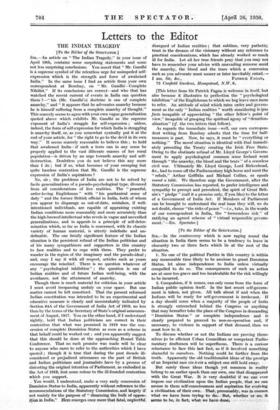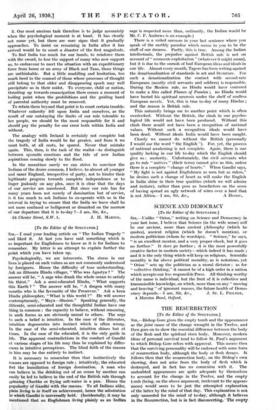[To the Editor of the SPECTATOR.] SIR,—In the controversy which
is now raging round the situation in India there seems to be a tendency to leave in obscurity two or three facts which lie at the root of the situation.
1. No one of the political Parties in this country is within any measurable time likely to be anxious to grant Dominion Status, let alone independence to India unless virtually compelled to do so. The consequences of such an action are at once too grave and too incalculable for the risk willingly
to be incurred. . ,
2. Compulsion, if it comes, can only come from the force of Indian public opinion itself. In the last resort self-govern- ment is taken, not given. All talk about if and when the Indians will be ready for self-government is irrelevant. If a day should come when a majority of the people of India is strongly entrenched behind the Congress or anything that may hereafter take the place of the Congress in demanding " Dominion Status " or complete independence and is clearly prepared to proceed to non-co-operation and, if necessary, to violence in support of that demand, then we must bow to it.
To discuss whether or not the Indians are proving them- selves to be efficient Urban Councillors or competent Parlia- mentary draftsmen will be superfluous. There is a curious reluctance to face' this last fact, as if it involved something shameful to ourselves. Nothing could be further -from tho truth. Apparently the old traditionalist ideas of the prestige of an Imperial race vis-a-vis a subject one still hold sway.
But surely those ideas though yet common in reality belong to an earlier epoch than our own, one that disappeared with the Great War. It is very doubtful if we can ever impose our civilization upon the Indian people, that we can arouse in them self-consciousness and aspiration for evolving a civilization of their own. That, presumably, was in essence what we have been •trying to do. But, whether or no, it seems to be, in fact, what we have done _ _ 3. Our most anxious task therefore is to judge accurately when the psychological moment is at hand. It has clearly not come yet, but there are sure signs that it gradually approaches. To insist on remaining in India after it hits arrived would be to court a disaster of the first magnitude.
To find India too much for our hands, to reinforce theni with the sword, to lose the support of many who now support us, to endeavoui to meet the situation with an expeditionary force from home or an army of Black and Tans, those things are unthinkable. But a little muddling and hesitation, too much heed to the counsel of those whose processes of thought still belong to that older and disappearing epoch may well precipitate us in their midst. To everyone, child or nation, thrusting up towards emancipation there comes a moment of boiling point when the prohibitions and the guiding hand of parental authority must be removed.
To retain them beyond that point is to court certain trouble. Whatever calamity fell upon India and ourselves, as the result of our outstaying the limits of our rule tolerable to her people, we should be the most responsible for it and should pay the penalty for our error both within India and without.
The analogy with Ireland is certainly not complete but the tragedy of India would be far greater, and from it we must both, at all costs, be spared. Never that mistake again. This, then, is the task of the realist—to distinguish between sporadic emotions and the tide of new Indian aspirations coming slowly to the flood.
In the meantime surely we can strive to convince the Indians of the desire common, I believe, to almost all younger and saner England, irrespective of party, not to hinder their legitimate progress towards complete independence or to linger jealously on any plea, once it is clear that the days of our service are numbered. But since our rule has for many years been not merely of domination but of service, is it too much to ask Indians to co-operate with us in the interval in trying to ensure that the India we leave-shall be not more confused or belligerent or disunited on the morrow of our departure that it is to-day ?—I am, Sir, &c.,





































 Previous page
Previous page